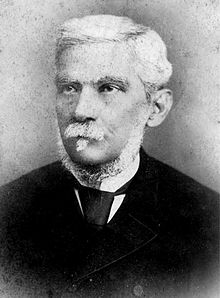Bartolomé Calvo Díaz
| Bartolomé Calvo | |
|---|---|
 |
|
| 2nd President of the Granadine Confederation | |
|
In office 1 April 1861 – 18 July 1861 |
|
| Preceded by | Mariano Ospina Rodríguez |
| Succeeded by | Tomás Cipriano de Mosquera |
| 3rd Governor of Panama | |
|
In office 1 October 1856 – 1 June 1858 |
|
| Lieutenant | Francisco Fábregas |
| Preceded by | Francisco de Fábregas |
| Succeeded by | Ramón Gamboa |
| 8th Envoy Extraordinary and Minister Plenipotentiary of Colombia to Ecuador | |
|
In office 18 April 1886 – 20 January 1889 |
|
| President | Rafael Núñez |
| Preceded by | Sergio Camargo |
| Succeeded by | Francisco de Paula Urrutia Ordóñez |
| Personal details | |
| Born |
Bartolomé Calvo Díaz de Lamadrid 24 August 1815 Cartagena de Indias, Bolívar, United Provinces of New Granada |
| Died | 2 January 1889 (aged 73) Quito, Pichincha, Ecuador |
| Resting place | Central Cemetery of Bogotá |
| Nationality | Colombian |
| Political party | Conservative |
| Spouse(s) | Isidora Martí |
| Alma mater | University of Magdalena |
| Occupation | Lawyer, Diplomat, Journalist (Typographer, Editor) |
Bartolomé Calvo Díaz de Lamadrid (August 24, 1815 – January 2, 1889) was a Colombian lawyer, journalist, and statesman, who became President of the Granadine Confederation, in what is now Colombia, in 1861 in his role as Inspector General, because no elections were held on that year to decide the presidency. He also served as Governor of Panama and Ambassador to Ecuador, and worked in a number of newspapers.
Bartolomé Calvo Díaz de Lamadrid was born on August 24, 1815 in Cartagena de Indias, in what was then the United Provinces of the New Granada. Orphaned at an early age, he spend his youth working in the print shop his father had left him and his brothers. He attended the University of Magdalena where he graduated in Jurisprudence.
He was married to Isidora Martí.
Calvo inherited the passion for journalism from his father, one of the oldest typographers of Cartagena. After finishing his studies, he worked for the newspapers La Civilización and La República, and then he moved to Panama where he became the publisher and editor of El Correo del Istmo.
After that he became editor-in-chief of La Estrella de Panamá, the Spanish language section of the trilingual newspaper The Daily Star & Herald. Calvo’s strong political views, however, did not meet the commercial interests of the newspaper owners, and Calvo refused to compromise his views, which led to the closing of La Estrella and his firing.
When the Vice-Governor Francisco Fábregas took over the State as Governor in replacement of Justo Arosemena, he named Bartolomé Calvo as his Secretary of State. By now, racial tensions generated by the United States and the Americans living in Panama were getting very violent, Panamanians were angry that the Americans were taking all the jobs and the Americans discriminated the population. On the morning of April 15, 1856 a riot known as the Watermelon War took place. The results of this were very hard for the administration who was blamed by the United States and had to pay substantial damages.
...
Wikipedia
